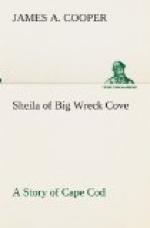“It does seem too bad,” sighed Prudence. “She was a pretty baby, as you say, Ira.”
“Sarah was nice as she could be to you,” was the old man’s thoughtful comment.
“Yes. But her husband, Bostwick, was only a mechanic. Of course, he left nothing. Them city folks are so improvident,” said Prudence. “I wish’t we was able to do something for little Ida May, Ira. Think of her workin’ behind a counter!”
“I am a-thinkin’,” growled the old captain. “See here, Prue. What’s to hinder us doin’ something for her?”
Prudence looked at him, startled.
“Why, Iry, you say yourself we can scurce help ourselves.”
“It’s a mighty ill wind that don’t blow fair for some craft,” declared the ancient mariner, nodding. “We do need help right here, Prudence, and that gal of Sarah Bostwick’s could certainly fill the bill. On the other hand, she’d be a sight better off here on the Cape, living with us, getting rosy and healthy, and having this old place and what we’ve got left when we die, than she would be slavin’ behind a counter in any city store. What d’you think?”
“Ira!” exclaimed his wife, clasping her hands, potato knife and all. “Ira! I think that’s a most wonderful idea. It takes you to think up things. You’re just wonderful!”
Cap’n Ira preened himself like the proud old gander he was. He heaved himself out of the chair by the aid of his cane, a present from one grateful group of passengers that had sailed in his charge, on the Susan Gatskill.
“Well, well!” he said. “Let’s think of it. Let’s see, where’s my glass? Here ’tis.”
He seized the old-fashioned collapsible spyglass, which he favored rather than the newer binoculars, and started off to “pace the quarter,” as he called the path from the back door to the grassy cart track which joined the road at the lower corner of the Ball premises. This highway wandered down from the Head into the fishing village along the inner beach of Big Wreck Cove. Prudence watched Ira with fond but comprehending eyes. She saw how broken he was, how stumbling his feet when he first started off, and the swaying locomotion that betrayed that feebleness of both brain and body that can never be denied.
Somewhere on the Head in the old days the wreckers had kept their outlook for ships in distress. Those harpies of the coast had fattened on the bones of storm-racked craft. It was one of those battered freighters that, nearly two centuries before, had been driven into the cove itself, to become embalmed in Cape history as “the big wreck.”
The Balls and the Lathams, the Honeys and the Coffins of that ancient day had “wracked” the stranded craft most thoroughly. But they had not overlooked the salvation of her ship’s company of foreigners. She had been a Portuguese vessel, and although the Cape Codder, then, as now, was opposed to “foreigners,” refuge was extended to the people saved from the big wreck.




